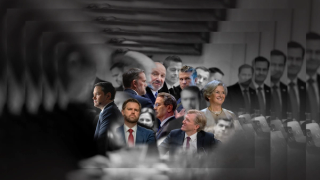Introduction
The first months of President Donald Trump’s second term in office have been a whirlwind of executive orders, controversial appointments, unconventional economic policy and bureaucratic upheaval. But even while executive power and policy decision-making have become increasingly centralised in Trump’s hands, there is still a constellation of appointees, officials and advisors within the administration who wield considerable policymaking power and influence over the president’s thinking.
Below is a selection of some of the most influential foreign policy players in the second Trump administration and what Australians should know about them. Their experience, views on the Indo-Pacific and US foreign policy, and actions taken during the administration’s early days can help de-mystify the administration’s evolving foreign policy direction — and help Australians to understand the priorities of their most important ally.
JD Vance
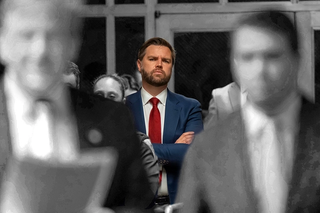
Vice President
Senate confirmation: Not required
The role
Joe Biden once said, “it’s easy being vice president, you don’t have to do anything.” Nevertheless, vice presidents can act as highly influential advisors and confidants to the president. In his first few months in office, Vance has emerged as a foreign policy attack dog and key congressional liaison for Trump in his second term, helping to shepherd a number of controversial cabinet appointments through the Senate. The high profile nature of the role also places him in prime position for a potential presidential run of his own in 2028 or beyond. This trajectory contrasts starkly with former Vice President Mike Pence, who lacked a significant public profile and has since become a vehement Trump critic.
The background
Vance emerged on the national stage in 2016 because of his bestselling memoir Hillbilly Elegy, which described his Rust Belt upbringing. The former marine and venture capitalist once proclaimed himself a “Never Trump guy” and was a strong critic of Trump during the 2016 election, but later apologised for his comments in 2021, when he sought Trump’s endorsement for a successful Senate run in Ohio in 2022. Since then, Vance positioned himself as one of Trump’s most loyal and aggressive surrogates, helping him earn him the position of Trump’s running mate in 2024.
The top-line for Australia
Vance’s ‘America First’ foreign policy approach involves a shift of US focus away from Europe and towards China, which Vance argues is more directly in line with US interests. He has pushed for US foreign policy to prioritise US national interests rather than values and has indicated support for the AUKUS agreement. Vance has also denounced continued support for Ukraine, but is strongly in favour of aid to Taiwan and Israel.
- America First foreign policy | Vance has lauded Trump’s presidency as “the first real disruption to a failed consensus” in US foreign policy. Vance’s early endorsement of Trump’s reelection in 2023 – a year before the Republican presidential primaries began – saw Vance specifically point to Trump’s “successful foreign policy” as the “most important part” of Trump’s legacy because the former president “started no wars,” and pushed for Europe to “take more responsibility for its own defense.” Vance has repeatedly emphasised the need to prioritise Asia in US foreign policy because China is “our most important geopolitical foe.”
He has said that he is “a fan of AUKUS” and that in Asia, “we have to try to promote those with aligned interests and encourage those who are a little bit more on the fence to think about things from our perspective.” Vance has described neoconservative foreign policy as “strategically and morally stupid” and said that a strong domestic manufacturing base is “the most important component of projecting power overseas.” - Pivot to China | Vance describes his strategic position on China as a “straightforwardly economically nationalist argument, [and] even though it may cost a couple basis points of GDP, we should be making more of our stuff.” In the Senate, he co-sponsored the China Trade Relations Act, which would revoke China’s permanent most-favoured-nation status, due to his support for American manufacturing.
Vance has argued that the United States should disengage from Ukraine, saying in 2023 that US foreign policy needs to "stop the focus on Ukraine... to focus on China because that’s where the real enemy is.” Vance has said that an invasion of Taiwan is “the thing that we need to prevent more than anything" because it “would decimate our entire economy” due to Taiwan’s dominance of the semiconductor industry. He also praised the Biden administration’s CHIPS and Science Act of 2022, which seeks to bolster US domestic semiconductor manufacturing, calling it “a great piece of legislation.” - Isolationist on Europe | Vance has said that the war in Ukraine is unsustainable and wrote in April 2024 that he “remain[s] opposed to virtually any proposal for the United States to continue funding this war.” He has promoted decreasing US support to Europe, saying that “the United States has provided a blanket of security to Europe for far too long.” However, Vance disagrees that the United States should pull out of NATO, and has also stated that “the point is not we want to abandon Europe. The point is we need to focus as a country on East Asia, and we need our European allies to step up in Europe.” He repeated this message at the Munich Security Conference in 2025, during which he chastised European leaders and said the largest threat to Europe was not Russia or China but “the threat within” European governments themselves.
In the administration thus far
Vance has maintained a highly visible role in the Trump administration’s foreign policy agenda and was notably involved in Trump’s fiery Oval Office meeting with Ukrainian President Volodymyr Zelenskyy in February 2025. However, his first task as vice president was shepherding Trump’s cabinet nominees through the Senate, and he cast the tiebreaking vote in favour of Secretary of Defense Pete Hegseth’s confirmation.
He has met twice with Indian Prime Minister Narendra Modi, including in a visit to India, where he delivered an optimistic message describing India as a “friend” with whom the United States wanted to “strengthen our relationship.” Vance has also been at the forefront of administration demands for allies to increase their defence spending and contributions — a core part of his message to European governments at the Munich Security Conference in February, as well as in various meetings with European leaders and a controversial visit to Greenland in March. Vance’s views on Europe featured in the ‘Signalgate’ scandal in March, when he said, “I just hate bailing Europe out again.” Vance has also featured prominently in the administration's public diplomacy, meeting with Pope Leo XIV in the Vatican and inviting him to the White House.
Marco Rubio
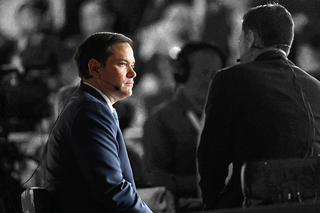
The role
The Secretary of State is central to US foreign policy as the head of the powerful State Department. They are the most senior member of the cabinet besides the vice president, and fourth in the presidential line of succession. The Secretary regularly travels abroad and plays a key role in international diplomacy and treaty negotiations, leading the US foreign service of embassies around the world. However, under Trump, Rubio has had to contend with a range of other administration officials and Trump advisors seeking to influence US foreign and trade policy. The State Department in the first Trump administration faced significant budget cuts and policy marginalisation. Rubio has, so far, managed to earn Trump’s praise and additional responsibilities, at least personally, but also overseen the process of significant budget cuts.
After Mike Waltz was removed as National Security Advisor in May 2025, Rubio was also named as his acting replacement, making him the first person to hold both roles simultaneously since Henry Kissinger in 1975.
The background
Since 2016, Rubio has gone from a firm Trump opponent to one of his most influential cabinet members. Seen as a rising star of the Republican Party since he was elected in 2010 to represent Florida in the US Senate, where he stayed until joining the second Trump administration. He ran directly against Trump in the 2016 Republican presidential primaries and attacked him as a “con artist,” but later endorsed each of Trump’s presidential campaigns and was a top contender to be Trump’s 2024 presidential running mate. As a senator, Rubio had a strong focus on supporting an active US foreign policy, particularly regarding Latin America during Trump’s first term.
The top-line for Australia
Given his record of support for international allies and partners, global leaders and members of Congress both looked to Rubio to provide an element of stability in the new administration. His comparatively conventional views helped him to secure a unanimous Senate confirmation vote, in contrast to the controversial and partisan votes on his fellow appointees.
Nevertheless, Rubio has appeared to struggle to assert authority over some elements of US foreign policy, and was notably silent during the Oval Office confrontation between Trump, Vice President JD Vance and Ukrainian President Volodymyr Zelenskyy in February 2025. As a senator and within the administration itself, Rubio advocated for closer ties with Australia to counter China’s influence in Asia and the Pacific Islands. In 2017, he said that the Australia-US alliance was “among the best in the world, and the economic ties between our two countries support hundreds of thousands of American jobs.”
Rubio met Australian Foreign Minister Penny Wong in January 2025, where they “hailed the longstanding U.S.-Australia Alliance as foundational to international security and prosperity, and to a secure and prosperous Indo-Pacific region free from coercion”and discussed “security cooperation through AUKUS and bilateral defense initiatives [and] our partnership on critical minerals and global supply chain security.” Outside of this statement, Rubio has yet to publicly specifically speak at length about Australia as Secretary.
- Allies and partners | Rubio has previously emphasised the importance of “empower[ing] our allies and partners” when it comes to balancing China’s influence in Asia, saying in 2022 that “in the coming months and years, our alliances and partnerships with Taiwan, Japan, Korea, India, and others will be more crucial than ever,” although he has not been as explicit since becoming Secretary of State. In April 2024, he said that “Japan’s role as a key ally in matters of security, intelligence, and economic affairs cannot be overstated” and that “a trilateral alliance between the US, Japan and Korea would be a crucial foundation that furthers our joint efforts in the Indo-Pacific.” Now, travelling abroad as Secretary of State, Rubio has had to walk a fine line between reassuring US allies and delivering on Trump’s America First foreign policy agenda.
- Former free trader | Rubio began his career in the senate as a strong supporter of free trade policies, speaking in favour of free trade agreements in a 2011 Senate speech and arguing in favour of the Trans-Pacific Partnership in 2015, which he said would advance US “strategic goals in Asia and increase prosperity at home.” However, he began softening his support for the agreement in 2016 and has since condemned “cult-like faith in financial markets.” He has strongly supported US industrial policy in recent years to “rebuild our manufacturing sector,” and said that “there are times where the most efficient [economic] outcome is not the best outcome for America.”
- China hawk | Rubio is noted for his hawkish views on China, having regularly introduced legislation in the Senate targeting China’s human rights record. In 2022, he described China as “the most formidable near-peer adversary our nation has ever faced” and blamed the “destruction” of US manufacturing on its admission to the World Trade Organization and permanent normal trade relations status. He also repeatedly spoke in the Senate on the importance of US support for Taiwan, saying that an invasion of Taiwan by China would “literally just shut us down.” As Secretary of State, he has continued to criticise China’s trade practices and regional influence in the Indo-Pacific and Latin America.
In the administration thus far
The State Department was a primary target of Elon Musk’s Department of Government Efficiency during the early days of Trump’s term, evidenced by the significant staff layoffs and termination of foreign aid services such as USAID. While Rubio has defended many of the changes to his department and the shuttering of USAID, he clashed repeatedly with Musk over restructuring plans. Abroad, Rubio has been involved with peace negotiations between Russia and Ukraine (including threatening to walk away from them altogether), secured an agreement with El Salvador to imprison US residents and immigrants, and pressured Panama to limit its relations with China. He also hosted a Quad foreign ministers’ meeting on his first day in the administration, mere hours after being sworn in. In June, Rubio released a statement condemning sanctions imposed by US allies, such as Australia, on two Israeli cabinet officials.
Jamieson Greer
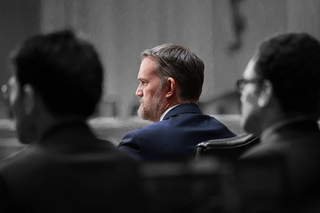
The role
The US Trade Representative (USTR) typically acts as the president’s primary trade advisor and leads trade negotiations with other countries and multilateral trade organisations. The Office of the USTR is also responsible for reporting on foreign trade barriers and resolving disputes in bodies such as the World Trade Organization. However, unlike during Trump’s first term, the role has taken somewhat of a backseat on trade policy to Secretary of Commerce Howard Lutnick, who Trump said would oversee USTR and “lead our tariff and trade agenda” in November 2024. With that said, Greer later insisted he still reports directly to the president.
The background
Prior to his appointment as USTR, Greer spent years delivering Trump’s trade agenda as chief of staff to then-USTR Robert Lighthizer during Trump’s first term. Greer worked on the administration’s implementation of tariffs on China and played a key role in securing congressional approval of the re-negotiated US-Mexico-Canada agreement. Outside of his work in government, Greer has worked for law firms on international business, trade, and engagement with USTR and other government agencies.
The top-line for Australia
Greer is an experienced negotiator who supports tariffs and has publicly attacked Australian trade policy. At the same time, he is also known for a diplomatic approach and connections in Europe and across Washington from his prior roles in and outside of government. He has consistently pushed for a particularly hard line on trade negotiations with China. While he sees some role for working with US allies and partners economically, he regularly emphasises an America First trade policy and has been an ardent supporter of Trump’s universal tariffs announced in March. He also disagrees with Australia’s strict policies on US technology companies and has said that discrimination against US tech companies “won’t be tolerated.”
- Trade tariffs | Greer supports tariffs and views them as a way to reduce the United States’ US$1.2 trillion trade deficit, which he blames on the policies of the Biden administration. In February, he said that Trump’s trade policies are a way to address “unfair trade practices, open new markets, tackle our record trade deficit and restore America’s ability to become a country of producers.”
In the wake of the administration’s universal tariffs in April, Greer argued that outreach by countries around the world looking for trade negotiations as evidence of tariffs moving US economic relationships “in the right direction.” He also said in April that the United States “must move away from an economy based solely on the financial sector and government spending, and we must become an economy based on producing real goods and services.” - Hard line on China | In May 2024, Greer argued that China is a “generational challenge” and that it must reduce both its tariffs and non-tariff barriers to trade. That month, he also said he wants export controls on China to be expanded to transportation equipment and aircraft and said “there is no silver bullet, and in some cases the effort to pursue strategic decoupling from China will cause short-term pain. However, the cost of doing nothing or underestimating the threat posed by China is far greater.” As part of his nomination hearing in February 2025, Greer said he intended to “review and rectify the imbalances in the US-China trade relationship” and supported strategic decoupling from China as well as revocation of China’s permanent normal trade relations status.
- Allies and partners | Greer believes that a “robust manufacturing base” in the United States is important for US allies as well as Americans, though in April 2025, he denounced what he argues are unfair trade practices by US allies, including Australia. Regarding cooperation with allies and partners such as India, Australia, Canada and in Southeast Asia, he said during his February 2025 confirmation hearing that “balanced and reciprocal terms” of trade are a prerequisite for closer cooperation, and that “there is no substitute for the technological, economic and military primacy of the United States.” When questioned about the imposition of tariffs on Australia in April 2025 despite deep ties and a trade surplus, Greer stated that the United States “should be running up the score in Australia” due to restrictions on US beef and pork and Australia’s digital trade and technology policies. US frustration with these restrictions has featured prominently in USTR publications across multiple administrations.
In the administration thus far
In the early days of the new administration, Greer met with various overseas representatives to discuss tariff exemptions, including Australian Ambassador to the United States Kevin Rudd. However, Greer has so far refused to consider exemptions for states such as Australia and Japan, and praised the impact of tariffs in April 2025 as a potential negotiating tool.
In March, USTR Greer stated that European Union retaliation against US steel and aluminium tariffs were “yet another indicator that the EU’s trade and economic policies are out of step with reality” and “completely disregards the national security imperatives of the United States.” Greer held “candid” trade talks with Chinese Vice Premier He Lifeng in March but said in April that China was not yet willing to negotiate on trade disputes. Nevertheless, he testified in April that not all USTR proposals to bolster US shipbuilding by imposing millions of dollars in fees on Chinese-built ships would be implemented. During a Senate Finance Committee hearing in April, Greer directly attacked Australian trade policies on agricultural imports and digital trade as cause for US tariffs. Trump announced a 90-day pause of most tariffs while Greer was testifying before the House Ways and Means Committee that month, resulting in attacks from representatives who accused Greer of either withholding information or being unaware of the impending tariffs decision.
Howard Lutnick
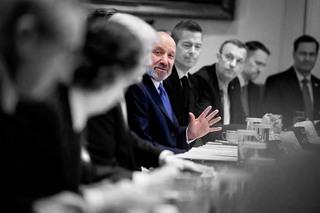
The role
The Secretary of Commerce is the most senior cabinet official on trade and commerce. As head of the Commerce department, they engage with US businesses and implement trade policy. The level of importance of the Commerce Secretary often varies in administrations. In the first Trump administration, Commerce Secretary Wilbur Ross often deferring to the more experienced USTR Bob Lighthizer while Biden administration Commerce Secretary Gina Raimondo overshadowed USTR Katherine Tai. In the second Trump administration, Lutnick has also been more central than USTR Green.
The background
Lutnick built his national profile and his multi-billion-dollar fortune during his leadership of financial services firm Cantor Fitzgerald – most notably in the wake of the 2001 World Trade Center attacks, which resulted in the deaths of hundreds of his employees, including Lutnick’s brother. Like Trump himself, Lutnick was previously a Democrat but began raising millions of dollars for Trump during his first term as president.
After the 2024 election, Lutnick was named co-chair of Trump’s transition team and oversaw the allocation of top Cabinet and administration positions, though his hopes to be Treasury secretary were dashed when Trump passed him over in favour of Scott Bessent. Luttnick has led the administration’s early trade and tariff policy, though was increasingly sidelined by Trump and Bessent in April 2025.
The top-line for Australia
Lutnick is central to the Trump administration’s economic policies and has surprised many Australians with his direct criticism of Australian trade and biosecurity policies. Lutnick has deep connections across Wall Street after a forty-year business career, though some administration insiders consider him too “abrasive" for public messaging, and tensions between him and other senior officials, such as Treasury Secretary Scott Bessent, have occasionally spilled into the open.
- Tariffs | Lutnick is a key proponent of the Trump administration’s tariff policies and has defended them as part of a US reset of global trade practices. He has stated that the United States would not consider exemptions on tariffs for any countries — including Australia — even if it were to change import policies. Instead, Lutnick has argued that the United States would offer “fairness” to all countries in trade. In many ways, Lutnick was one of the leaders of the April 2025 ‘Liberation Day’ tariffs but has since taken more of a backseat on the administration’s economic policies in favour of Bessent.
- Technological competition | Lutnick has been critical of China’s technology and intellectual property policies. In January 2025, he accused China of deliberately slowing US Patent and Trademark Office processing times by submitting vexatious applications and said he would ensure “American investors get taken care of quickly and effectively” to regain technological leadership.
During his confirmation hearing, Lutnick promised to enforce and pursue technology export restrictions to keep the United States “in the lead” on technological innovation. He also suggested China’s DeepSeek AI model was based on stolen intellectual property and that its use of US hardware is a reason to implement export controls and tariffs. - Critic of Australia | Despite Australia’s longstanding trade surplus with the United States, Lutnick has directly criticised Australia’s trade practices and biosecurity policies. In March 2025, he accused Australia of “dumping” cheap aluminium into the US market and described biosecurity concerns about US beef as “nonsense” and part of a deliberate strategy to “block our markets.”
In the administration thus far
Lutnick’s key responsibility during the early days of the administration has been as one of the architects and public faces of the administration’s reciprocal tariff policies. Lutnick championed the April ‘Liberation Day’ tariff announcement within the administration, which he said would be the day “the world starts taking us seriously." He also led the announcement of US$5m ‘gold cards’ for wealthy foreign investors as well as other more niche economic policies. However, his close relationship with the president and media presence has embroiled him in administration in-fighting over tariffs and their economic impacts, particularly with Bessent.
In June, Lutnick stated that the Trump administration is renegotiating contracts with semiconductor companies under the Biden administration’s CHIPS and Science Act of 2022 to get “more value for the same dollars.” He also announced that the Commerce Department is drafting a replacement to the recently revoked ‘AI diffusion rule’ introduced under the Biden administration, which he described as “illogical.” The forthcoming rule will facilitate US chip exports to allies on the condition that they are run by approved US data centre operators with US-managed cloud infrastructure.
Scott Bessent
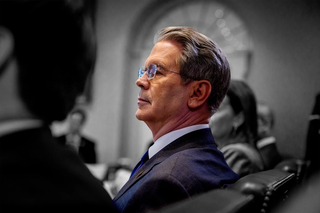
The role
The Secretary of the Treasury is the chief financial officer of the US Government, in charge of US fiscal policy. They are responsible for the formulation of both domestic and international financial, economic and tax policies as well as the management of public debt. The Treasury Secretary’s role also involves overseeing tax collection, the enforcement of sanctions against foreign entities, managing the fiscal budget and the printing of currency. Bessent is expected to play a key role in influencing Trump’s international trade policies. Former Secretary of the Treasury Steve Mnuchin was one of the few cabinet members to serve during the entirety of Trump’s first term and similarly proved to be a moderating voice on trade and economic policy.
The background
Scott Bessent comes from a long career in investment banking, working as Chief Executive and Investment Officer at global hedge fund Key Square Capital Management, which he founded in 2015. Prior to launching his own business, he was also Chief Investment Officer at Soros Fund Management. Like Lutnick, Bessent was previously supportive of the Democrats, donating money to presidential campaigns for both Hillary Clinton and Barack Obama. However, he has since co-hosted fundraisers for Trump’s 2024 re-election campaign.
Bessent served as an economic adviser to Trump throughout his 2024 presidential campaign and has been described as tough, persuasive and a self-proclaimed “deficit hawk,” as a supporter of the spending cuts proposed by the Department of Government Efficiency.
The top-line for Australia
Compared to fellow cabinet members Lutnick and Greer, Bessent is known to have a more moderate stance on tariff policy, though has still publicly supported tariffs as a negotiating tool. Prior to joining Trump’s cabinet, he expressed doubts regarding Trump’s tariff strategy. For now, Bessent is playing a public-facing role in Trump’s tariff policies, with administration officials describing Bessent’s role as a ‘good cop’ and noting his ability to moderate the protectionists in Trump’s cabinet who are pressing Trump to take a tougher stance on tariffs.
- China trade | Bessent has previously expressed concern about the “growing dangers of an ever-more antagonistic China,” and praised Trump in 2022 for his China policy during his first term. He has more recently also expressed serious concerns to his Chinese counterpart He Lifeng, about China’s economic imbalances, unfair policies and lack of counternarcotic efforts.
During his Senate confirmation hearing, Bessent called China “the most imbalanced, unbalanced economy in the history of the world.” He also declared that he aims to ensure that the United States retains its technological superiority over China in the technology domain, calling for more rigorous screening processes for US companies investing in China, specifically in AI, semiconductors and military companies. - Tariff strategy | While Bessent has stuck to the Trump administration’s tariff strategy, he has proven himself to be a moderating voice, reportedly persuading Trump to go ahead with the 90-day pause on reciprocal tariffs. Taking a leading role in trade discussions, he has begun prioritising trade agreements with US allies such as the United Kingdom, Australia, South Korea, India and Japan. Bessent has also recently revealed a grander strategy to reach trade agreements with these allies to “approach China as a group,” suggesting a potential grand encirclement approach, striking deals with Asian states to create a united front and apply increased pressure on China.
Bessent further noted that the Asian allies and partners have “been good military allies, not perfect economic allies.” In an interview in October 2024, Bessent floated the idea of a stratification of tariff levels predicated on adherence to US values and interests, as well as suggesting states benefiting from US defence guarantees buy long-maturity debt to pay upfront. - Hardline on sanctions | Bessent confirmed he would not hesitate to go “all in” imposing sanctions on Russia and Iran. During his Senate confirmation hearing, Bessent stated that he would support increased sanctions on the Russian oil industry to end the war in Ukraine. In March 2025, he criticised the Biden administration for imposing what he described as “egregiously weak sanctions” on Russia, claiming that weak sanctions on Russian energy have powered their war machine.
Regarding Iran, Bessent also stated that the US Treasury Department – which has responsibility for implementing financial sanctions on Iran – has launched a comprehensive campaign to “shut down Iran’s oil sector and drone manufacturing capabilities,” targeting every stage of Iran’s oil supply chain, imposing sanctions on all tankers carrying Iranian oil, as well as on a Chinese refinery for processing the oils.
In the administration thus far
Bessent has played a key role alongside Lutnick, Greer and chief White House trade counsellor Peter Navarro in implementing the reciprocal tariffs announced on ‘Liberation Day’ as well as being a driving force behind trade negotiations, after the 90-day reciprocal tariffs pause was announced. Bessent recently stated that he is hoping for “substantial clarity” at the end of this period regarding formulating new trade agreements with the United States’ 15 largest trading partners, excluding China.
Bessent has indicated that the tariffs of 145% on China were unsustainable. He has stated that he still has hope for striking a trade deal with China, noting, however, that it would require a substantively different approach to previous deals with China. He met with China’s Vice Premier He Lifeng in May and praised their “substantial progress” on trade negotiations.
During recent spring meetings with the International Monetary Fund and World Bank, Bessent reassured his audience that “America First does not mean America alone,” stating that the Trump administration is looking to “expand US leadership.”
Bessent then went on to criticise the institutions of what he characterised as mission creep, devoting too much attention to “climate change, gender and social issues,” and neglecting other initiatives, such as increasing energy access globally. In a speech to the Economic Club of New York in March, Bessent reaffirmed his ultimate goal to “rebalance the international economic system,” stressing that “access to cheap goods is not the essence of the American dream.” Bessent has also met with various overseas delegations, including Australian Treasurer Jim Chalmers, at a superannuation summit in Washington, DC in February.
In June, Bessent called on the Senate to vote in favour of the Republican tax cuts and spending bill (also known as the One Big Beautiful Bill) currently before Congress, arguing that failing to pass the reconciliation legislation would be “cataclysmic” and could trigger a global financial crisis. Bessent is also reportedly a top candidate to replace Jerome Powell as the Federal Reserve Chair at the conclusion of his term in May 2026.
Pete Hegseth
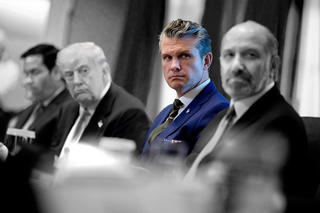
The role
The Secretary of Defense is responsible for overseeing the Department of Defense as well as the entire US military. They are the administration’s principal defence policy maker and advisor, and manage the defence budget as well as property and equipment, including over 1,000 domestic and international US military bases. In his first term of office, President Trump had five Defense Secretaries and frequent acrimonious disputes with them.
The background
Hegseth has led a diverse career, studying at Princeton and Harvard before briefly working as an equity markets analyst at Bear Stearns, and then joining the Minnesota National Guard in 2003, where he was deployed to Guantanamo Bay, Iraq and Afghanistan. He later worked at the conservative think tank The Manhattan Institute of Policy Research, before becoming the executive director of Vets For Freedom, where he allegedly nearly drove the organisation to bankruptcy by spending donations on parties and personal expenses as well as inappropriately drinking during work hours.
In 2012, Hegseth ran for the US Senate but dropped out before the Republican primary contest began, instead going on to become a Fox News contributor and then the cohost of Fox & Friends Weekend until 2024. Confirmed as Secretary of Defence by the smallest possible margin, Hegseth faced heavy scrutiny during his Senate confirmation over his lack of relevant experience, accusations of sexual assault and heavy drinking. Hegseth, in response, admitted that he is “not perfect, but redemption is real” and vowed to stop drinking if confirmed.
The top-line for Australia
While perhaps best known for his political commentary and social media appearances, Hegseth has nonetheless been outspoken in his intention to deter and confront Chinese aggression in the Indo-Pacific – a position consistent with prior Secretaries of Defence. He has emphasised the need to strengthen alliances with Indo-Pacific countries like the Philippines, Japan and Australia, and called on US allies in Asia to increase defence spending. Hegseth has further confirmed his strong support for the AUKUS partnership, noting that technology sharing and submarines will play a large part in US Indo-Pacific strategy.
- Firm support for AUKUS | Hegseth has made it clear that he supports the US-Australia alliance and the AUKUS agreement, which he described as a “signature part” of the bilateral relationship. In February, he met with Australian Deputy Prime Minister Richard Marles to discuss shared defence and security priorities, following Australia’s first contribution under AUKUS to the US submarine industrial base, and highlighted Australia and the United States’ “strong bond across many generations." Hegseth stated that President Trump is “aware” and “supportive” of the agreement and has described it as critical to enhancing US capabilities in the “subterranean space,” noting that “this is not a mission in the Indo-Pacific that America can undertake by itself.”
- Deterring China | Hegseth has established himself as an outspoken China hawk, recently stating that “China poses a threat to people and peace in the region.” He travelled to the Panama Canal in April, where he publicly accused China of attempting to take control of the canal through infrastructure projects and surveillance, and lamented that the United States had fallen “asleep at the wheel.”In his first official trip to the Philippines in March, the two countries agreed to a four-piece plan that builds upon the US agreement to commit US$500 million to modernise the Philippine’s military, adding a bilateral training program, increased defence industrial cooperation and a cyber campaign.
Hegseth promised that the two countries would collaborate to convince other regional countries to “step up their efforts” and strengthen deterrence in the Indo-Pacific. Hegseth also met with Japanese Defence Minister Nakatani, reaching an agreement to accelerate the plan to jointly produce missiles, as well as announcing the upgrading of US Forces Japan to a Joint Force Headquarters, to improve coordination of bilateral operations and increase readiness. During the visit with his Japanese counterpart, Hegseth also discussed granting US forces greater access to Japan’s southwest islands, which are in closer proximity to Taiwan. - Tough line on NATO | Hegseth met with leaders at NATO headquarters in February and reassured them of US support for the alliance. However, he challenged allies to increase spending on defence and to take the lead in supplying Ukraine with weapons, noting that the United States would no longer “tolerate an imbalanced relationship.” Hegseth also insisted that no US troops would be deployed to Ukraine and that no troops from NATO countries in Ukraine would be covered by Article 5 of the NATO treaty. He further remarked that, although the United States also desired a “sovereign and prosperous Ukraine,” returning to pre-2014 borders would be an “unrealistic objective.” Nevertheless, Hegseth praised NATO as a “great” alliance and has since reiterated US commitment to the treaty.
In the administration thus far
Hegseth has implemented deep staffing cuts in the Defense Department and eliminated the Women, Peace and Security program at the Pentagon, a program signed into law by Trump himself in his first administration, calling the program a “woke/social justice/Biden initiative that overburdens out commanders and troops” as well as a distraction from warfighting. Hegseth made headlines during the ‘Signalgate’ scandal — and a second chat leak — but despite coming under heavy fire for the scandals, Trump has stood by Hegseth thus far, saying, “he’s gonna get it together.”
Hegseth has already met with his Australian, Philippine and Japanese counterparts, including on a relatively conventional trip through Asia, affirming US support for Indo-Pacific treaty allies and announcing US investments in deepening defence cooperation. In a joint appearance with Australian Deputy Prime Minister Richard Marles, Hegseth praised AUKUS and described Australia as at “the forefront of our alliance [in the Indo-Pacific] and throughout the world” and “as a robust an alliance as we have in the entire world.” In a speech delivered at the Shangri-La dialogue held in Singapore in late May, Hegseth called for US allies in the Indo-Pacific to ultimately boost defence spending to 5% of GDP to “share the burden,” because “Beijing is credibly preparing to potentially use military force to alter the balance of power in the Indo-Pacific.” During a sideline meeting with Defence Minister Marles at the dialogue, he specifically demanded that Australia increase its defence spending to 3.5% of GDP “as soon as possible,” to which Prime Minister Albanese responded “we’ll determine our defence policy.”
Susie Wiles
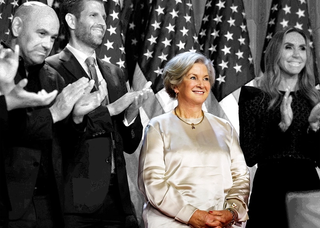
Chief of Staff
Senate confirmed: Not required
The role
The most senior political appointee in the White House, the US president’s chief of staff wields significant influence, essentially acting as a “gatekeeper” to the president — though Wiles has pushed back on this characterisation. A president’s chief of staff generally ensures that the White House runs smoothly, with responsibility for day-to-day operations such as overseeing the president’s schedule, managing staff, and liaising with other policymakers. The first Trump administration featured four separate chiefs of staff, who often clashed with the president and struggled to mediate internal disputes and tensions.
The background
Susie Wiles has served as Trump’s “de facto” chief of staff since the August 2022 midterm elections, “overseeing his comeback” and remaining loyal to Trump during his political isolation following January 6. As co-chair of his 2024 presidential campaign, Trump credited Wiles for her pivotal role in his successful election bid, as well as describing her as an “integral part” of his 2016 and 2020 campaign efforts. Wiles previously directed Trump’s crucial Florida campaign in 2016 and served as CEO of Trump’s political action committee and primary fundraising tool, Save America, from 2021–2022.
Her prior experience mainly consists of political campaign management and lobbying. While in 2018 she was credited with reviving Florida Governor Ron DeSantis’ gubernatorial campaign, the pair fell out shortly after, which reportedly led DeSantisto launch what she called “a vicious, all-out, frontal attack” to have her removed from Trump’s 2020 presidential campaign. However, while Wiles is a “veteran of Florida politics,” she has little experience in federal government and has been described as a “Washington outsider.”
The top-line for Australia
Nicknamed the “ice maiden” by Donald Trump, Susie Wiles is the first female presidential chief of staff in US history. The low-profile Republican strategist and veteran Florida political operative is a Trump loyalist who has outlasted many in his inner circle and was a key player behind his successful 2024 presidential bid. As chief of staff, Wiles sees her core responsibility as providing the president with “unvarnished information and complete truth.” She is regarded as a rare moderating influence on Trump, who has been credited with presiding over a significantly more disciplined White House — marked by reduced staff turnover and fewer leaks — compared to his first term.
- Trump’s top confidante | Wiles self-identifies as a moderate and in 2016 described herself as a “card-carrying member of the GOP establishment.” She has spent eight years in Trump’s orbit, and is regularly referred to as the president’s “most important advisor” and“by far his closest aide.” In announcing her as his presidential chief of staff, Trump praised Wiles as “tough, smart, innovative and is universally admired and respected,” however, noted she “likes to stay in the background.” Wiles is known to avoid the spotlight and prefers to keep a low profile, with commentators having described her as a “force more sensed than seen” and her influence on political events “as obvious as it is invisible.”
She is recognised as one of the few steadying forces on Donald Trump. During his 2024 presidential run, Wiles reportedly encouraged Trump to focus on the economy at his rallies, persuaded him to embrace postal voting, hired many of Trump’s lawyers and helped him navigate legal troubles, and was involved in bringing former presidential combatant turned ally Robert F Kennedy into Trump’s campaign. - Overseeing a disciplined White House | Wiles stands alone as the only Trump campaign manager to complete a full election cycle without being fired or demoted. While in his first term, Donald Trump had record turnover in the chief of staff role, with four people holding the position, Wiles has said that she intends to stay for all four years of Trump’s term. She is credited with bringing greater professionalism and discipline to Trump’s 2024 campaign.
Similarly, in the White House, Wiles has previously stated that she feels “pretty comfortable” that she can “instill order at the staff level” and argued that Trump has evolved since 2016: “the organization will have different sensibilities than it had in the first term.” Compared to Trump’s first term, there has so far been a notable reduction in West Wing infighting — a cohesiveness which Wiles attributes to careful selection of staffers and a zero tolerance for leaks.
In the administration thus far
Wiles has touted the White House’s “great working relationship” with both chambers of Congress and maintains that President Trump will be able to pass legislation on most of his campaign priorities “without any cuts to Medicare, Medicaid, or any senior benefits.” She previously stated the goal of “getting off to a quick start and staying on that pace,” and has since given the administration an “A+” for productivity, citing President Trump’s record number of executive orders, crackdown on immigration and efforts towards securing trade deals with US partners. Wiles has also characterised Trump’s cabinet picks as part of the administration’s “secret sauce,” commending even the controversial choices as “spectacular professionals.”
Elbridge Colby
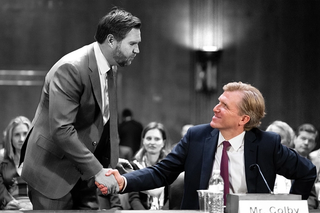
The role
The Under Secretary of Defense for Policy is the Pentagon’s “chief strategist,” who serves as the principal advisorto both the Secretary of Defense and Deputy Secretary of Defense on all national security and defence policy matters. The number three ranking Pentagon official, the Under Secretary plays an integral role in “strategy development, resourcing, contingency planning, and force evaluation,” notably leading the development and implementation of the US National Defense Strategy. The first Trump administration featured three different acting Under Secretaries of Defense for Policy before the confirmation of John Rood in 2018, who ultimately resigned at Trump’s request in February 2020 following clashes with the president over Ukraine.
The background
Elbridge Colby’s early career included five years working across the Department of Defense, Department of State, and intelligence community, including stints with the Coalition Provisional Authority in Iraq in 2003 and with the Office of the Director of National Intelligence (2005–6). In 2015, Colby was considered for a senior position in Jeb Bush’s 2016 presidential campaign but was ultimately not selected after dissent from “prominent, interventionist neoconservatives.” As the Deputy Assistant Secretary of Defense for Strategy and Force Development in the first Trump administration, Colby led the drafting and implementation of the 2018 National Defense Strategy, which reoriented US foreign policy towards strategic competition with Russia and China. Despite some Republican criticism, including senators privately expressing “serious concerns,” Colby was ultimately confirmed as Under Secretary of Defense for Policy in April 2025 following a pressure campaign by top Trump allies, including Vice President Vance, who has described Colby as “a friend and one of the best foreign policy guys in the country.”
The top-line for Australia
Colby has spoken favourably about Australia on multiple occasions, describing Australia as “perhaps our closest ally in the world” and characterising the bilateral security relationship as “very strong.” However, he has also urged Australia, as well as Japan and Taiwan, to lift defence spending to 3% of GDP. He has notably expressed scepticism about the feasibility of the AUKUS partnership and in June the Defense Department announced that he would lead a review into the agreement. Colby is a strong advocate for redirecting US attention and resources to the Indo-Pacific and has called for the United States to deter China through strengthening US military credibility in a denial defence strategy.
- Reservations about AUKUS | Colby previously described himself as a sceptic of the AUKUS pact. His key concern is that selling Australia submarines diminishes the US “material warfighting capability in the near term,” and has said that it would be “crazy” for America to have “fewer SSNs in the right place and time.” He has expressed concern about a “very real threat of a conflict in the coming years” and said that US SSNs would be “absolutely essential” for the defence of Taiwan, arguing that AUKUS could create issues if the United States cannot “produce the attack submarines in sufficient number and sufficient speed.” However, he has reportedly grown “more receptive” to the deal due to Australian investments in the US submarine base, and in August 2024 described himself as “AUKUS agnostic.” In his Senate confirmation hearing, despite reiterating his concerns about AUKUS, Colby ultimately called it a “great idea” for Australia to acquire nuclear attack submarines, and said that the US Government should “do everything we can to make [AUKUS] work.”
- Projecting military strength in Asia | Colby views China as “the top external threat to America – by far” and “the biggest, most powerful rival we have faced in probably 150 years.” He has stated that Beijing is “actively preparing for a conflict,” and argued that preventing China’s regional hegemony should be the foremost strategic objective of US strategy under what he describes as “prioritised engagement.” Colby strongly supports a shift of US focus and resources to the Indo-Pacific, previously describing the Middle East as geopolitically “relatively unimportant” and saying that “Ukraine should not be the focus.” During the first Trump administration, Colby “orchestrated the United States’ pivot to Asia through changes to force posture, acquisition priorities and strategic focus.” In his 2021 book, Colby advocates for the United States to adopt a “denial defence strategy,” whereby it could “prepare to win a war with China it cannot afford to lose – in order to deter it from happening.” In his view, the United States “need[s] to be a hawk to get to a place where we can be a dove,” and ensure that it has credible, capable military forces to deter possible Chinese aggression.
- Indo-Pacific allies and partners | Colby has argued for building an “anti-hegemonic coalition” of US partners to maintain the balance of power in the Indo-Pacific. He has emphasisedthe strength of the US relationships with Japan, South Korea, the Philippines, Taiwan, and India — as well as calling for deepened engagement with Vietnam. While Colby has highlighted the role of groupings like the Quad, he has expressed scepticism about formalising a NATO-like alliance in the Indo-Pacific, due to the distinct circumstances of regional partners and political capital required. He has argued for greater allied military contributions, calling for Japan to spend 3% of its GDP on its military and for Taiwan to increase defence spending from 2.5% to 10% of GDP. Although Colby supports increased US focus on the Indo-Pacific, he has stated that North Korea is “not the primary issue for the US” and believes that South Korea should take greater responsibility for its own defence and consider acquiring nuclear weapons. However, he has described Taiwan as “very important” to the United States and said that “defending Taiwan makes sense.” In 2024, he sharply criticised Taiwan for an “alarming lack of urgency” in "dramatically increasing its defense capabilities.”
In the administration thus far
In May 2025, Colby began the development of the 2025 National Defense Strategy, which will prioritise “defence of the US homeland,” deterring China in the Indo-Pacific and increasing burden-sharing with US allies and partners. He is also reportedly leading a Pentagon review into AUKUS, to evaluate whether the agreement established under the Biden administration is “aligned with the president’s America First agenda.” In the month prior to his Senate confirmation, Colby urged Australia to lift its defence spending to 3% of GDP, arguing for this to be the “main concern that the United States should press” with its otherwise “excellent” ally.





